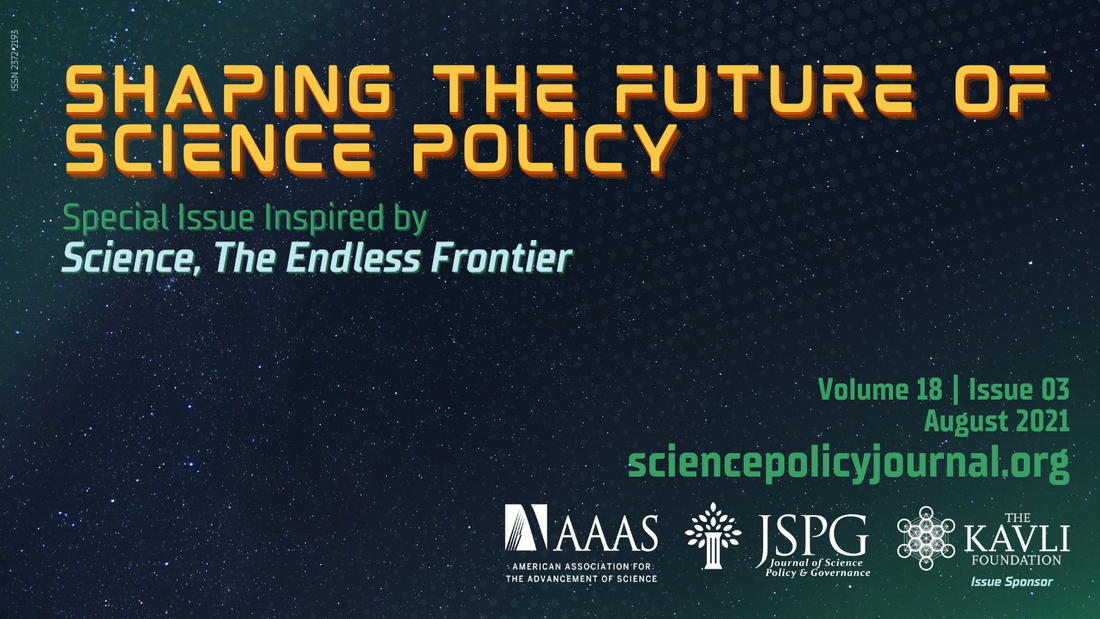JSPG, AAAS and The Kavli Foundation Release Special Issue on Shaping the Future of Science Policy8/30/2021
FOR IMMEDIATE RELEASE
Media Contacts
Special Issue Inspired by the 75th Anniversary of Science, The Endless Frontier Released
Washington, DC (August 30, 2021) – With support from The Kavli Foundation, the Journal of Science Policy & Governance (JSPG) and the American Association for the Advancement of Science (AAAS) are proud to release the Special Issue on Shaping the Future of Science Policy.
The issue builds on and from Vannevar Bush’s 1945 signature text Science, The Endless Frontier, which called for a centralized approach to government-sponsored science. Recommendations from the report led to the creation of the National Science Foundation, the development of the American research university, and generated fundamental policy frameworks underlying the basic research enterprise in the U.S.
“For over 75 years, U.S. science policy has been guided by Vannevar Bush’s seminal report Science the Endless Frontier,” said Tobin Smith, JSPG Governing Board Member and Vice President for Science Policy and Global Affairs at the Association of American Universities. “This special issue of JSPG will help elevate the voices of early career researchers and professionals with an interest in science policy as they share their hopes and dreams for what U.S. science policy should look like for the next 75 years.”
“As a cornerstone of American science policy, The Endless Frontier laid the groundwork for much of where the industry is today. But while this text was innovative in 1945, today our society is facing novel challenges that will require creative policy solutions designed by the next generation to address problems that were unanticipated during Vannevar Bush’s time,” said JSPG CEO Adriana Bankston.
Additionally, through a policy position paper competition, winning articles were selected by experts at the science, policy and society interface, and winners received cash prizes. The winning articles include:
"With persuasive narrative and actionable recommendations, our authors crafted a new vision for the future of science policy – one that is both expansive and inclusive,” said Andy Sanchez, JSPG’s Junior Assistant Editor-in-Chief for Special Editions. “They interrogated how we support scientists, how scientists engage with the public, and how we can ensure equitable access to the benefits of scientific progress. This issue honors the legacy of The Endless Frontier and paints an exciting path forward for science policy."
To facilitate high level, expert dialogues on policy issues in The Endless Frontier and other relevant topics today, earlier this year JSPG and AAAS hosted a series of webinars sponsored by The Kavli Foundation. These webinars generated novel ideas for redesigning the framework under which science policy operates today and re-imagining the future of the field for the next 75 years.
“Imagining the next 75 years of science policy in the U.S., and the necessary infrastructures needed to be successful, requires inviting and listening to multiple perspectives,” said Brooke Smith, Director of Public Engagement with Science at The Kavli Foundation. “It is inspiring to read the many contributions in this special issue, from individuals who are early in their careers and so passionately focused on making a difference today and for decades to come.”
###
ABOUT JSPG
The Journal of Science Policy & Governance (JSPG) is a nonprofit organization and open-access peer- reviewed publication managed by and for students, policy fellows, and young scholars in science, technology, and innovation policy. Since 2011, JSPG has served as a vehicle for students and early career researchers to bolster their research and writing credentials in science policy. Visit sciencepolicyjournal.org and follow on Twitter @SciPolJournal to learn more.
ABOUT AAAS
The American Association for the Advancement of Science (AAAS) is the world’s largest general scientific society and publisher of the journal Science, as well as Science Translational Medicine; Science Signaling; a digital, open-access journal, Science Advances; Science Immunology; and Science Robotics. AAAS was founded in 1848 and includes more than 250 affiliated societies and academies of science, serving 10 million individuals. Science has the largest paid circulation of any peer-reviewed general science journal in the world. The nonprofit AAAS is open to all and fulfills its mission to “advance science and serve society” through initiatives in science policy, international programs, science education, public engagement, and more. For additional information about AAAS, see aaas.org.
ABOUT THE KAVLI FOUNDATION
The Kavli Foundation is dedicated to advancing science for the benefit of humanity. The foundation’s mission is implemented through an international program of Kavli research institutes, initiatives and symposia in the fields of astrophysics and theoretical physics, nanoscience and neuroscience, as well as the biennially awarded Kavli Prize and a program in public engagement with science. For additional information about the Kavli Foundation, visit kavlifoundation.org and follow @kavlifoundation. Comments are closed.
|
JSPG NewsAll the latest news from the Journal of Science Policy & Governance. Archives
April 2024
Categories
All
|
- Home
- About
-
Volumes
- Volume 24 Issue 01
- Sigma Xi and Rita Allen Foundation - Civic Science for Transformative Policy Solutions to Societal Challenges
- Volume 23 Issue 01
- APS Policy and Governance on Science, Technology and Global Security
- IAI Development Policy and Global Change Science to Achieve the Vision of Sustainable Americas
- Volume 22 Issue 01
- GHFUTURES2030 Strengthening Youth-centered Policy and Governance of Digital Transformations in Health.
- UNESCO AND MGCY OPEN SCIENCE POLICIES AS AN ACCELERATOR FOR ACHIEVING THE SUSTAINABLE DEVELOPMENT GOALS
- Volume 21 Issue 01 >
- JSPG and UCL STEAPP Special Topics: Innovations in Science Diplomacy >
- Sigma XI-JSPG Special Issue: Re-envisioning STEM Education and Workforce Development for the 21st Century
- Volume 20 Issue 01
- JSPG Volume 19 Issue 01 (10 Years of Publishing)
- Special Issue: 2021 NSPN-JSPG Policy Memo Competition
- Special Issue: Shaping the Future of Science Policy
- JSPG-UK SIN Special Issue: Climate Change Solutions
- Volume 18 Issue 01
- Special Issue: 2020 NSPN-JSPG Policy Memo Competition
- Volume 17 Issue 01 (Supported by AAAS STPF)
- JSPG-UN MGCY Special Issue: Impacts of Emerging Technologies
- Volume 16 Issue 01
- Volume 15 (Supported by CSPC)
- Special Issue: 2019 NSPN-JSPG Policy Memo Competition
- Volume 14
- Volume 13
- Volume 12
- Volume 11
- Volume 10
- Volume 9
- Volume 8
- Volume 7
- Volume 6
- JSPG-UCS Special Issue: Healthy Food Policy
- Volume 5
- Volume 4
- Special Issue: Hot Topics 2013
- Volume 3
- Volume 2
- Volume 1
- Submit to JSPG
- Announcements
- Events
- Training
- Media Mentions
- Policy in action
- Podcast




 RSS Feed
RSS Feed
